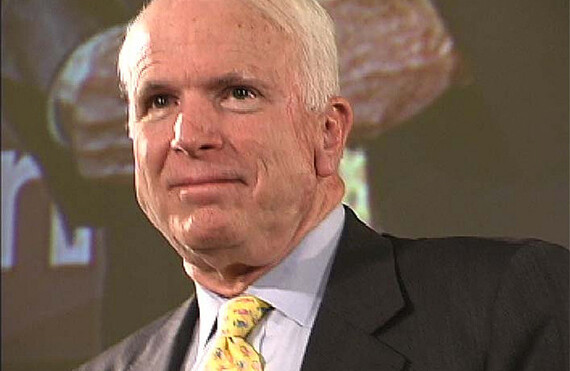"If I am elected president, I will call a summit of the world's democracies in my first year to seek the views of my democratic counterparts and begin exploring the practical steps necessary to [create a League of Democracies]. […] This organization could act when the UN fails to act—to relieve human suffering in places such as Darfur, combat HIV/AIDS in sub-Saharan Africa, fashion better policies to confront environmental crises, provide unimpeded market access to those who endorse economic and political freedom, and take other measures unattainable by existing regional or universal-membership systems."
John McCain introduced the above idea of global democracy during his 2008 U.S. presidential election campaign. The idea is worth exploring, and perhaps further than McCain intended.
What McCain proposes is basically a synthesis between two schools of international affairs: neoconservatism and internationalism. Like neoconservatives, McCain insists that spreading democracy across the world is the magnetic north of his foreign policy compass. He says the next president must be assertive in promoting America's values despite predictable protests from China or Russia, Venezuela or Iran.
Like internationalists, McCain recognizes the importance of collaboration and says that, while the United States should try to lead by persuading its allies, it should also "be ready to be persuaded by them." McCain is bound to be disappointed, for even democracies sometimes fail to persuade each other.
The question of a nuclear Iran is looming and will likely become just as divisive as Iraq was in 2003. The tough choice between neoconservatism and internationalism would then come back to haunt McCain. Either he would have to ignore his allies in the League of Democracies, or he would accept multilateral paralysis in the face of danger—which would not go well with his hawkish instincts.
And yet a synthesis between neoconservatism and internationalism is the right foreign policy doctrine for the 21st century. A League of Democracies will work only if the United States lets it be truly inclusive of all nations that accept human rights norms, regardless of how the United States may otherwise perceive those nations. There must also be true power-sharing among allies. Eventually, the League of Democracies should itself be run democratically—an extension of McCain's idea that presumably he does not endorse at this time.
As things stand now, countries like Russia or India, Brazil or Venezuela have only two options: either pay allegiance to the United States on security matters, or become "strategic competitors" or "states of concern," sowing the seeds of new conflict. As the Iraq War has shown, even traditional NATO allies no longer accept alliance without voice.
A democratic League of Democracies would offer an attractive choice to proud nations that embrace democracy (which could eventually include China: communism there is unlikely to last forever). They could work alongside the United States and other democracies as truly equal partners.
Some countries would continue to reject democracy, and hence not apply for membership. Still, an open League of Democracies would be less threatening than a closed club like NATO. Tension could certainly arise if the League of Democracies were to act without the blessing of the United Nations. But such tension would be productive, buttressing global public policies that benefit the world's people rather than cocooning authoritarian regimes.
Would the United States surrender any sovereignty by creating a League of Democracies? With globalization, sovereignty is traded daily. The U.S. government is making compromises with other governments on a range of global public policies, particularly but not exclusively in the economic domain.
In the security area, President Bush boasted that "America will never seek a permission slip to defend the security of our country." After the Iraq fiasco, the next president may well do just that over Iran: He or she will think twice before launching a preemptive attack without broad international support.
The reality is that divergent foreign policy among allies undermines everyone. Poor support from allies has increased the U.S. burden in Iraq; but even allies who took no part in that war feel less secure as a result of the mess it created.
A League of Democracies that pooled the power and sovereignty of allies could act inclusively and decisively. If need be, after a period for mutual persuasion, the League could move to a vote. All allies would own the majority decision, and accept its consequences. No go-it-alone fiasco; no multilateral paralysis.
Majority voting is critical to avoid paralysis in democracies. It is amazing that Americans accepted the election of George W. Bush based on a sliver of votes in Florida. And yet they did. By contrast, multilateralism is grinding to a halt. International institutions make most decisions by consensus, and consensus is increasingly unattainable in today's world.
The stakes are ever higher, making compromise harder. Global public policies like the Doha Development Round of trade negotiations, the replacement of the Kyoto Protocol on climate change, sanctions against Iran's nuclear program, or against Sudan's genocide in Darfur deeply affect people around the world.
Moreover, the number of players that are too powerful to ignore has increased dramatically. As emerging countries assert economic might, Europeans and Americans are slowly coming to terms with the fact that they can no longer dictate global public policies.
Citizens of democracies around the world already know that their nation's sovereignty is limited. They accept compromises. They even accept damaging stalemates. In the decades to come, they should learn to accept majority voting as a means to break deadlocks and produce global public policies that are better for the common good.
The European Union has set a precedent in this regard. It is the only international institution where majority voting takes place with each nation's vote reflecting more or less its demographic weight. Consensus remains the norm. But the real possibility of voting concentrates officials' minds and helps break deadlocks.
Of course, Europeans are a more cohesive polity than all the world's democracies. But European citizenship was not really more pronounced back in 1957 than global citizenship is today. On many levels—English as lingua franca, penetration of global media, weight of diaspora—the world is more interdependent today than Europe was when it started its project of political integration.
The world can follow Europe's journey this century, and a League of Democracies would be a good first step in 2009.
![]() This article is licensed under a Creative Commons License.
This article is licensed under a Creative Commons License.
Please read our usage policy.




